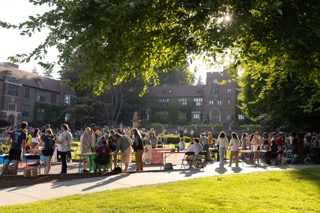
By Grace Farrell
From Beekeeping Club to Repertory Dance Group, our campus offers an abundance of unique clubs for students to continue exploring their passions or to cultivate new interests. ASUPS promotes student participation in these campus organizations with annual events like LogJam and encourages students to establish clubs in line with their hobbies.
However, some students have encountered financial challenges when trying to get funding from ASUPS that make ensuring a stable schoolwide position for their club increasingly difficult.
Junior Tunya Carissimo is one such individual. She’s an avid chess player and decided to establish a club where people can come together to appreciate the intrigue of its strategic techniques.
Midway through last semester, Carissimo embarked on the club establishment process by finding additional student leadership members, which ensured that the club satisfied requirements enacted by ASUPS for official student organizations.
“I had a treasurer, vice president, and all that stuff, but then I kind of realized I could just do it all and it was no big deal,” Carissimo explained. After Chess Club was officially established, she set her focus on purchasing materials needed to hold weekly meetings.
Clubs rely on specific budgets granted by ASUPS for purchasing materials. Carissimo hadn’t yet been granted her proposed budget and decided to buy materials herself with the hope that ASUPS would later refund her, something she admittedly “hadn’t heard good things about” when she conversed with other students in club leadership positions.
Sure enough, Carissimo has since had trouble acquiring a refund for the approximate $120 she spent on chess boards and other supplies for the club. She now has a consistent 10-15 members that attend her weekly meetings but notes that greater financial stability granted through this reimbursement would help to further her club, which is still fairly new .
Sarah Comstock, Vice President for Student Affairs and Dean of Students, outlined the process ASUPS has for club approval and budgeting.
While she doesn’t coordinate directly with ASUPS and therefore isn’t personally involved in this process, she’s aware of a comprehensive student budget designated by the University to Student Affairs based on the number of undergraduate students Puget Sound expects to attend in the upcoming school year.
Comstock said that the University doesn’t coordinate with ASUPS on club budgeting directly after granting this sum of money since doing so would be “interfering with the larger campus culture” that’s determined by organic student involvement in clubs.
Each spring, clubs communicate with the legislative and judicial portions of ASUPS to advocate for a specific budget based on events and meetings they plan to organize for a specific number of members. The ASUPS Senate – which consists primarily of current Puget Sound students with a select representation of staff members – then designates a specific amount of funding for each approved club, which the club can either accept or reject with hopes of re-appealing for a higher budget.
While Carissimo’s experience with getting an established budget wasn’t particularly problematic in itself, she notes that the internal communication of ASUPS seems disorganized since she was never reimbursed for her original club-related purchases.
Similar experiences have been reported by other student leaders around campus. Jaad Jawdat, treasurer for Beekeeping Club and Physics Club, noted that it was especially hard to get clubs running this year since budget forms didn’t become available from ASUPS until late September. Even then, the clubs have gotten no response from ASUPS after submitting their budgeting forms about six weeks ago. Jawdat noted that both his clubs have struggled significantly because of this.
“I think people I’ve talked to have genuinely tried to help,” Carissimo acknowledged, “but it’s a lot of redirecting.” She described her communications with ASUPS as being a “domino effect of passing me onto the next person until eventually I’m talking to the same people.”
The ASUPS budgeting process appears thorough and helpful, but the logistics of reimbursements and requirements imposed on individuals trying to establish a club remain burdensome. With the abundance of resources available at Puget Sound, club leaders remain troubled that the club establishment process is so difficult.
